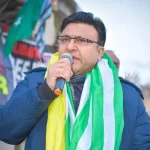BEIRUT: A fuel tank blast in Lebanon early on Sunday killed 28 people and injured nearly 80, authorities and medics said, burning a crowd clamouring for petrol in the crisis-hit country.
The tragedy in the remote north overwhelmed medical facilities and heaped new misery on a nation already beset by an economic crisis and severe fuel shortages that have crippled hospitals and caused long power cuts.
It revived bitter memories of an enormous explosion at Beirut port last August that killed more than 200 people and destroyed swathes of the capital.
An adviser to the health ministry said the death toll from the blast in Al-Tleil village in the Akkar region had climbed to 28. The Lebanese Red Cross said 79 others were injured.
The army began raiding petrol stations to curb hoarding by suppliers following a central bank decision to scrap fuel subsidies.
The official National News Agency (NNA) said the blast followed scuffles between “residents that gathered around the container to fill up gasoline” overnight.
Hospitals in Akkar, one of Lebanon’s poorest regions near the border with Syria, and in the northern port city of Tripoli said they had to turn away many injured because they were ill-equipped to treat severe burns.
“The corpses are so charred that we can’t identify them,” said Yassine Metlej, an employee at an Akkar hospital. “Some have lost their faces, others their arms,” Metlej said.
A security source said DNA testing would start “soon” to identify victims.
Health Minister Hamad Hassan said he was in contact with countries including Turkey, Kuwait and Jordan to evacuate serious cases abroad.
Ismail al-Sheikh, 23, burned on his arms and legs, was driven by his sister Marwa to Beirut’s Geitawi hospital, some 80 kilometres away.
“We were informed that the army was distributing gasoline… so people flocked to fill it in plastic containers… straight from the tank,” Marwa said. Some said a lighter sparked the blast, she said; other witnesses claimed shots were fired.
The explosion was widely seen as a direct consequence of official negligence that had pushed the country deeper into free fall. “The dead are victims of a careless state,” Marwa said.
Sawsan Abdullah burst into tears at Geitawi hospital when a doctor told her that her son, a soldier, was in a critical condition. He had only been looking for petrol so he could go to his job in the army, she said. “He’s my only son!” Abdullah yelled, falling to the floor.President Michel Aoun ordered a probe into the blast and chaired an emergency meeting of the defence council, his office said. The meeting agreed to provide hospitals with the diesel they desperately need to power generators, said a statement.
The council also called on the government to task security forces with monitoring the storage and distribution of fuel to prevent further incidents.
Angry Akkar residents raided and torched a vacant house believed to belong to the owner of the plot where Sunday’s explosion took place, the NNA reported.
The blast comes less than two weeks after Lebanon marked the first anniversary of the Beirut port explosion.








